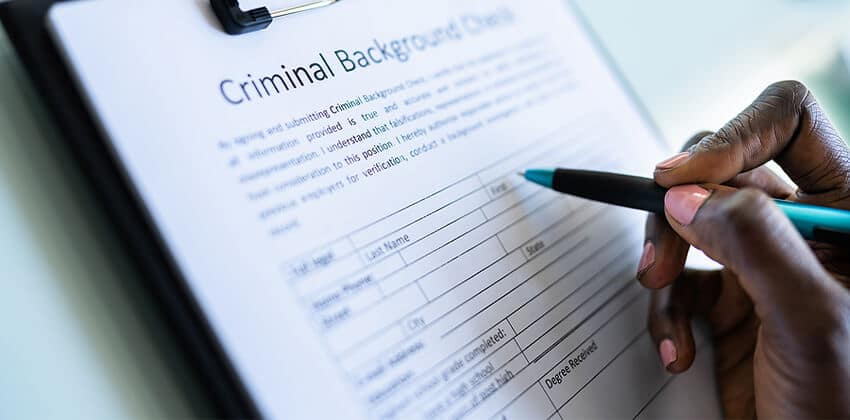
After all this time tailoring resumes and updating your LinkedIn profile, you are delighted to be moving forward. You got a job offer at one of your dream companies! But the employer just notified you that they would be conducting a background check. Now what?
If you’ve never had to complete a background check before, it can be a little intimidating to think about someone checking into your past. Perhaps you couldn’t remember the exact starting month of employment for one of your previous jobs, and you guessed. Is that going to disqualify you? Probably not. We’ll go through the basics of a background check here.
Why Are You Having to Complete a Background Check?
Contrary to what you might believe, employers don’t require background checks simply because they’re concerned you’re going to steal from them. More likely, your prospective employer requires background checks to ensure they’re doing their due diligence. They are responsible for providing as safe a workplace as possible for their employees, as well as ensuring that the person in the role is truly as qualified as they say they are.
Employers need to verify a person’s history to provide the safest work environment possible. This often focuses on criminal activity and includes employment activity and references. Consider somebody operating machinery they claimed to have experience with during the application process. If it turns out that they are unfamiliar with that machinery and someone gets hurt, the employer can be liable.
Protecting More Than Physical Interests
It’s not just the physical damage that is an issue, either. Qualification fraud is the crime of misrepresenting your references, education, title, or previous role. And Business News Daily shares that applicants who falsify their information, receiving an offer that otherwise would have gone to someone else, can be sued for defamation.
Employers are also ensuring the security of you and your fellow employees by verifying the backgrounds of their new hires. If an employer discovers that someone is not who they say they are during a background check, the employer has potentially saved the other employees from years of hassles if their backgrounds were to be stolen. Studies show that up to 50% of identity theft begins at work.
Or, in the worst-case scenario, what if someone is hiding a violent history and later causes physical harm or death to a coworker or a customer? These are all areas that can be assessed during a background check.
What Do Background Checks Include?
For most jobs, the background check is a routine verification of your employment and criminal history. It ensures that you are indeed who you claim to be and that your education, work, and residence history match up. You’re not required to have a spotless background, but you need to be upfront with your experiences. Finding out that an applicant was part of the 85% of employees found to be dishonest on their application often leads to a job-offer withdrawal.
Then there are more security-sensitive roles that will require a more thorough history. Think airlines, financial institutions, and educational facilities, for starters. If you’re applying for a job at one of these organizations, know that your background will be under greater scrutiny. You’ll most likely have a credit check, address verification, employment history, criminal history, and more. For many of these roles, you’ll need to verify your information for a minimum of 10 years with no gaps unaccounted for.
How Will Your Background Check Work?
To ensure an equitable hiring process, background checks are completed by an independent third party specializing in the service. Generally, later in the hiring process, after an offer has been extended, you’ll be notified by the recruiter that a background check is forthcoming.
According to Hire Right (a company that performs pre-employment verifications), you’ll be sent a disclosure form by your prospective employer. You’ll need to sign the form authorizing the background check, and you’ll be provided with contact information for the search company.
They go on to share that there are several means through which they’ll gather the information, such as public records found online or in a courthouse, calling previous employers, and verifying employment.
Regarding An Accidental Discrepancy
If it’s discovered that you made a minor error, the chances are good that an employer will not hold it against you. During the background check, you can update your information if you discover a pay stub stating you were slightly off on your employment dates.
Or, perhaps there was a traffic violation that you forgot about because eight years ago is a long time to try and remember. Come clean to the employer because they are going to find out anyway. Most managers recognize minor discrepancies as honest mistakes.
For more significant or intentional lies or failure of a drug test, the employer is legally required to notify you if it adversely affects your employment opportunity. You then have the option to dispute the charge with the consumer reporting agency (CRA) that completed the background check. While this might not guarantee that you’ll get that same offer again, it can be resolved before it derails a future job offer.
It’s worth noting that the CRA reports the findings but has no say regarding whether your offer is withdrawn or not. The employer requesting the search determines whether or not you move forward.
Get Your First-Day Outfit Ready
Waiting for your background check to return can be a challenging delay in starting your new job. Know that you’re in good company, as up to 95% of employers require some form of verification. While you’re waiting, spend time getting ready for your first day and learning everything you can about the new company culture. The chances are pretty great that you’ll be cleared to begin quickly.
Don't forget to share this article with friends!




